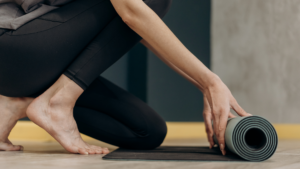Discovering the Power of Holistic Approaches to Overcome Anxiety
In a fast-paced world filled with constant stress and pressure, finding effective ways to manage anxiety has become more important than ever. With an increasing interest in holistic healing and overall well-being, individuals are now turning to natural remedies to reduce anxiety. Dharte explores the power of these practices, delving into the latest scientific research and expert insights to help readers find a sense of calm and tranquility.
Anxiety can manifest in various ways, affecting individuals differently. Some may experience increased heart rate, rapid breathing, or restlessness, while others may encounter unexpected symptoms like itching or even painful thoughts. However, persistent anxiety could indicate an anxiety disorder or a related condition, which calls for attention and care.
Staying Active: A Natural Path to Serenity
Scientific studies have highlighted the profound connection between physical activity and anxiety reduction. Engaging in regular exercise not only diverts attention from anxious thoughts but also triggers positive changes in brain chemistry. Serotonin, GABA, BDNF, and endocannabinoids are brain messengers associated with anti-anxiety benefits. According to a study conducted over 21 years, individuals with physically active lifestyles have a 60% lower chance of developing anxiety symptoms compared to their less active counterparts.
Limiting Alcohol Intake: Unveiling the Link
Excessive alcohol consumption disrupts the brain’s delicate neurotransmitter balance, which can lead to anxiety symptoms. The relationship between anxiety disorders and alcohol use disorder has been well-documented. By reducing alcohol intake, individuals may observe improvements in both anxiety and depression symptoms.
Stopping Tobacco Use: Clearing the Smoke
Smoking cigarettes and anxiety symptoms often coexist, with individuals experiencing anxiety being more likely to use tobacco. Quitting smoking has been shown to significantly alleviate anxiety symptoms, allowing individuals to regain control of their mental well-being.
Limiting Caffeine Intake: Calming the Nerves
Caffeine has been acknowledged as a potential trigger for anxiety, especially in individuals living with panic disorder. Several studies have reported an increase in anxiety and panic attacks due to caffeine consumption. While moderate caffeine intake is generally safe, reducing or eliminating caffeine altogether can lead to a significant reduction in anxiety symptoms.
Prioritizing Quality Sleep: A Gateway to Emotional Well-Being
In a world where sleep deprivation has become the norm, getting sufficient rest is crucial for managing anxiety. The Centers for Disease Control and Prevention (CDC) recommends seven or more hours of sleep each night, highlighting the importance of sleep hygiene. Simple habits like following a consistent sleep schedule, creating a comfortable sleeping environment, and avoiding stimulating activities before bed can contribute to reducing anxiety symptoms.
Meditation and Mindfulness: Cultivating Inner Peace
Practicing meditation and mindfulness has gained popularity as effective tools in anxiety management. These techniques aim to increase awareness of the present moment and foster a nonjudgmental acceptance of thoughts and emotions. Studies have found that mindfulness-based stress reduction programs can alleviate anxiety symptoms as effectively as prescription medications.
Embracing Holistic Nutrition: Nourishing the Soul
Maintaining a balanced diet is an essential aspect of overall well-being, including mental health. Nutritional deficiencies, dehydration, and the consumption of processed foods high in artificial additives have been linked to changes in mood and anxiety. Opting for a wholesome diet rich in complex carbohydrates, fruits, vegetables, and plant based proteins can positively impact anxiety symptoms.
Unlocking the Power of Deep Breathing: Taming Anxiety One Breath at a Time
Deep breathing exercises offer a simple yet effective technique to restore regular breathing patterns and reduce anxiety symptoms. By slowing down and intentionally taking deep breaths, individuals can alleviate the physical manifestations of anxiety, such as a racing heart or lightheadedness.
Indulging in Aromatherapy: The Scent of Serenity
The ancient practice of aromatherapy holds tremendous potential in promoting relaxation and overall well-being. Essential oils such as bergamot, lavender, clary sage, grapefruit, and ylang-ylang are believed to have anxiety-relieving benefits. While the FDA does not regulate essential oils, their potential health benefits have garnered attention from the scientific community.
Soothing with Chamomile Tea: A Steaming Cup of Tranquility
Chamomile tea has long been regarded as a natural remedy for anxiety. Research has shown that chamomile significantly reduces anxiety symptoms without causing addiction or reoccurrence. This calming beverage, rich in the flavonoid apigenin, acts on the same brain receptors targeted by anti-anxiety medications.
In a world increasingly focused on holistic wellness, incorporating natural remedies for anxiety management presents a promising path to inner peace. From engaging in physical activity to exploring mindfulness techniques and nourishing the body with wholesome nutrition, individuals can reclaim control over their mental well-being. Embracing these practices can lead to a calmer, more balanced life.
Credits: elementalhealth_uk
Also Read: Secrets to Staying Active and Healthy on Your Travels






